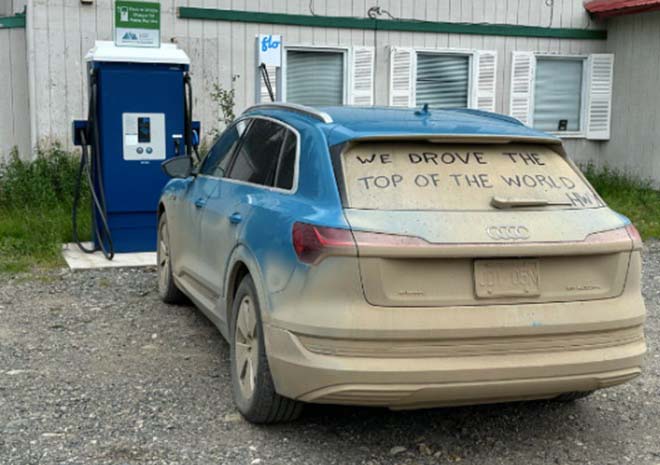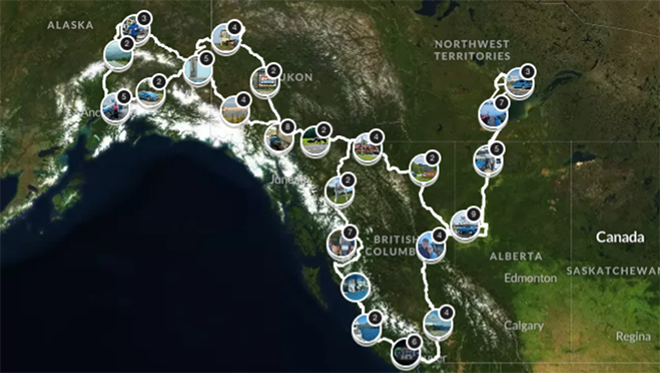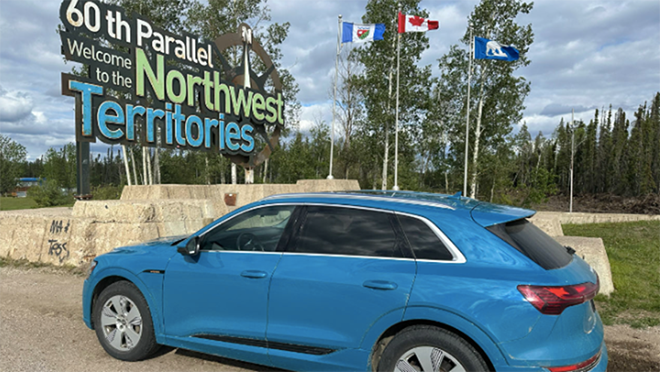 While Harvey Soicher of Vancouver plugged his 2019 Audi e-tron into a charger in Cantwell, Alaska, he and his co-pilot Therese dined on a grilled curry chicken sandwich at the adjacent Jamaican restaurant.
While Harvey Soicher of Vancouver plugged his 2019 Audi e-tron into a charger in Cantwell, Alaska, he and his co-pilot Therese dined on a grilled curry chicken sandwich at the adjacent Jamaican restaurant.
Tips, anecdotes and more in the leadup to World EV Day 2025
To Harvey Soicher, some numbers around EVs mean a lot more than others.
He doesn't care that his 2019 Audi e-tron's 0-to-100 km sprint time is a modest 5.7 seconds. He only cares that it's much faster than most gas-powered cars, and that he feels more confident and safe while passing slow trucks or navigating tight merging lanes onto the Lions Gate Bridge.
He doesn't care that the EPA range rating of his Audi – which has logged more than 150,000 km through road trips from Vancouver to Newfoundland, Yellowknife and Alaska – is a modest (by today's standards) 324 km. He opted for smaller low rolling resistance tires that, with his driving habits, has given him an average range of 360 km and at times more than 400 km.
One number he does like is 10: about the number of seconds it takes to plug an EV into a home charger. It's the figure he cites when challenged by EV skeptics who claim that charging an EV wastes valuable time.
"Think it's an inconvenience to charge on a long trip?'," says Soicher. "Do the math and add up the time it takes you over a year to gas up your car each week. Compare that to the 10 seconds it takes to plug your car in at home overnight so that you'll never have to go to spend time at a gas station."
His argument is that, other than on road trips, you're going to save a lot of time "filling up" an EV. And he says that you'll be surprised at what happens on Canada's main highways, especially with fast chargers such as the 180 kW options offered at a growing number of BC Hydro EV network sites. Our network is at 147 charging sites and growing – many with 180 kW fast chargers and some sites with ultra-fast 350 kW chargers – and is one of the most reliable public EV charging networks.
"I say to the doubters, You don't have to wait for your car to charge – your car has to wait for you," he says.
His point, hammered home with the fervour of the revolutionary, is that you need to eat, and you need bathroom breaks.
"Your range is your bladder," he says, with a wink.
Did you know? World EV Day is set for September 9, 2025, just a few days after the return of Everything Electric Vancouver, the world's leading EV and home energy show. Check out our new 400 kW charger at the show and enter to win prizes at our booths.
 You can follow Soicher's Far North trip, along with notes and images from along the way, on his Polarsteps page. The trip started with a Vancouver-to-Yellowknife segment before looping back, up to Alaska and then back through B.C. for a scenic route via B.C.'s Inside Passage ferry to Vancouver Island.
You can follow Soicher's Far North trip, along with notes and images from along the way, on his Polarsteps page. The trip started with a Vancouver-to-Yellowknife segment before looping back, up to Alaska and then back through B.C. for a scenic route via B.C.'s Inside Passage ferry to Vancouver Island.
EV road trips in honour of his late wife Mary Ann
Ask Soicher to talk about EVs, and the floodgates open. You get a rush of anecdotes, numbers and advice mined from his many hours on the road, including a "Cannonball Run" style sprint in the Audi from Newfoundland to Vancouver he managed in just over four days, 18 hours.
Soicher's stories continue at a rapid pace until he slows, choked up in his retelling of his time with his late wife Mary Ann. The couple had planned to drive to Newfoundland in 2019, but after she lost her battle with cancer in 2018, he dedicated his first EV trek to Newfoundland in her name. He not only dedicates his ongoing long-distance EV adventures to Mary Ann, but continues to raise funds for her favourite charity.
"Back in 2002, way prior to her passing, Mary Ann had a ruptured brain aneurysm," says Soicher. "We went to Vancouver General Hospital, and the neurosurgeon on call that evening did a full craniotomy – about an eight-hour surgery. She was so brave. So brave. And she made an amazing full recovery."
Mary Ann was so thankful that she began raising funds for research projects involving the neurosurgeon (Dr. Christopher Honey). Harvey continues the charity with his EV road trips – including Mary Ann's Electric Drive and his more recent Far North Electric Drive – with donations helping fund Dr. Honey's research into Parkinsons and other brain disorders
 Soicher's e-tron has logged more than 150,000 km on drives across North America, including stops in Newfoundland, California, Yellowknife and Alaska.
Soicher's e-tron has logged more than 150,000 km on drives across North America, including stops in Newfoundland, California, Yellowknife and Alaska.
Lessons learned from driving all over Canada and beyond
After Mary Ann's passing, Harvey only needed one car, and decided to try Audi's first electric vehicle. It proved a great fit for him, as he was still working as a sales rep in the ski and golf industry and needed an EV with a larger cargo space for his frequent trips all over Western Canada.
Now retired, Soicher says he was keen on an electric vehicle in large part because he could see huge savings on fuel costs. But it was the car's performance that won him over.
"The driving experience is out this world – way better," says Soicher. "I know some people in Teslas want to show off to their buddies how fast their car accelerates, but that speed is a safety factor too. With an electric car, you don't need a lot of space to merge, and when trying to pass a semi on a two-lane highway, it's a lot easier and safer."
His friend Therese was on board for his 11,000-km trip from Vancouver to Yellowknife, northern B.C., the Yukon, and Alaska. He relied heavily on BC Hydro fast charging sites in B.C., but as he headed farther north, he got more creative, plugging into campground power, car dealerships, and even a nephew's home charger when there were no public charging sites nearby.
Here are a few suggestions he has for the EV driver who likes to take longer trips:
- Choose smaller rims and low rolling resistance tires, which Soicher says can help your vehicle range by at least 10%. Soicher is running on Bridgestone Alenza 001 summer tires, and uses Nokian Hakkapeliitta tires in winter.
- If you have space in your vehicle, carry a full-size spare. Most EVs don't have any spare, automakers opting to save valuable space with either a tire sealant and inflation kit or run-flat tires that allow the driver to continue a limited distance after a loss of pressure.
- If it's an option, seriously consider adaptive cruise control, which he improves efficiency and reduces fatigue on the driver's mind and body.
- Get charging RFID cards for any networks you'll be using. "You can use charging apps, but there are times when you might have a weak phone connection when charging along a highway. That's when the RFID card really helps."
- Carefully plan your journey, using your car's built-in navigation system, PlugShare and other apps. Use the BC Hydro EV app to check availability of chargers at BC Hydro and roaming partner sites, and opt for highly-rated sites. PlugShare has a rating system out of 10, and most BC Hydro charging sites have a 10 score.
- Choose charging sites near amenities that include restaurants, shops, and tourist attractions.
- When staying overnight on the road, choose a hotel with Level 2 charging so that your car is fully charged by the morning. The best time to charge your car is when you don't need it.
Did you know? No matter what EV you drive, BC Hydro's charging network has you covered with connectors for CCS, NACS, and CHAdeMO. Learn more about our charging network and download the app today.